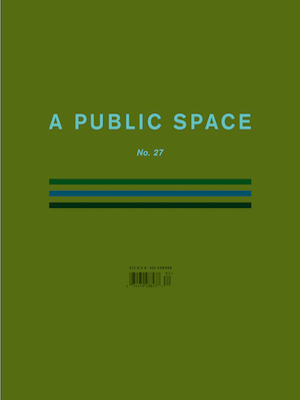Correspondence
137 Northeast Regional
Mónica de la Torre
Log in to read the rest.
If you are a subscriber but do not currently have online access, please contact us to link your subscription at subscribe@apublicspace.org
Not a subscriber?
Not yet a subscriber? Join us now, and become a part of the conversation.
About the author
Mónica de la Torre is the author of The Happy End/All Welcome (Ugly Duckling), Public Domain (Roof), and Talk Shows (Switchback); as well as two books in Spanish published in Mexico City, where she was born and raised. Her translation of Defensa del ídolo (Defense of the Idol), the sole book of poetry by the Chilean modernist Omar Cáceres, was published earlier this year by Ugly Duckling. She teaches in the Literary Arts program at Brown University.
